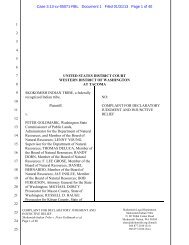Appellant Brief - Turtle Talk
Appellant Brief - Turtle Talk
Appellant Brief - Turtle Talk
Create successful ePaper yourself
Turn your PDF publications into a flip-book with our unique Google optimized e-Paper software.
3. The Right-of-Way is Void Because the State’s Interest in the<br />
Right-of-Way Did Not Vest Without Valid Federal<br />
Approval.<br />
It is a fundamental principle of Indian law that interests in Indian trust lands<br />
do not vest without valid federal approval. See United States v. S. Pac. Transp.<br />
Co., 543 F.2d 676, 697-98 (9th Cir. 1976) (citing 25 U.S.C. § 177); Johnson v.<br />
McIntosh, 21 U.S. 543 (1823); see also Cohen’s Handbook § 15.06[1]. While the<br />
Tribal Court could not find case law addressing specifically a failure to include<br />
these stipulations in a right-of-way, the cases make clear that interests in Indian<br />
property requiring approval by the Secretary of the Interior or her delegate do not<br />
vest where the approval is invalid. For example, in Sangre De Cristo Dev. Co.,<br />
Inc. v. United States, 932 F.2d 891, 893 (10th Cir. 1991), a development company<br />
signed a lease with Tesuque Indian Pueblo (“Pueblo”) to develop a residential<br />
community and golf course on Pueblo land. The Department of the Interior<br />
(“Department”) approved the lease. Id. The next year, neighboring landowners<br />
and nonprofit environmental groups filed suit against the government to enjoin the<br />
development, asserting that the United States’ approval of the lease was invalid<br />
54

















